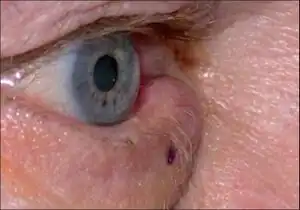Canaliculitis
| Canaliculitis | |
|---|---|
 | |
| Specialty | Ophthalmology |
| Symptoms | Excess tears, redness, pain and swelling of part of eyelid[1] |
| Diagnostic method | Visualisation, dacryocystography, ultrasound biomicroscopy[1] |
| Differential diagnosis | Dacryocystitis[1] |
| Treatment | Washing eye with normal saline, antibiotics, surgery[1] |
| Frequency | Uncommon[1] |
Canaliculitis is an infection of the lacrimal canaliculus of the eye, typically presenting with excess tears, redness, pain and swelling of part of the eyelid, followed by a swelling of the inner corner of the eye near the nose.[1]
The cause of most cases is unknown, but a blocked tear duct may increase the risk of canaliculitis.[1] Cosmetics may play a role in blocking the tear duct and therefore encouraging growth of bacteria.[1] Actinomyces israelii, Staphylococcus and Streptococcus have been isolated.[2] It can usually be diagnosed by looking at the eye, and if required can be confirmed by dacryocystography and ultrasound biomicroscopy.[1]
It accounts for around 2% of tear duct diseases.[1] The upper eye lid is less affected than the lower lid, and females are at greater risk.[1] The condition may be easily missed or misdiagnosed, and is probably not as rare as appears.[1]
Signs and symptoms
Diagnosis
Diagnosis is by its appearance.[1]
Differential diagnosis
Canaliculitis may appear similar to longterm conjunctivitis, chalazion, hordeolum internum, and longterm dacryocystitis.[1]
References
- 1 2 3 4 5 6 7 8 9 10 11 12 13 14 Pujari, Aditi; Ali, Mohammad Javed (2018). "17. Infections of the lacrimal drainage system". In Ali, Mohammad Javed (ed.). Principles and Practice of Lacrimal Surgery (2nd ed.). Singapore: Springer. pp. 182–190. ISBN 978-981-10-5441-9. Archived from the original on 2022-07-21. Retrieved 2022-07-21.
- ↑ Feroze, Kaberi B.; Patel, Bhupendra C. (2022). "Canaliculitis". StatPearls. StatPearls Publishing. PMID 28722951. Archived from the original on 2022-07-21. Retrieved 2022-07-21.
